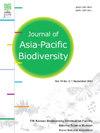Five species of macrofungi (Basidiomycota) new to Korea
IF 0.7
Q4 BIODIVERSITY CONSERVATION
引用次数: 0
Abstract
South Korea has more than 3300 islands, each with a unique ecosystem and biodiversity distinct from the mainland. These islands are rich in biological resources of high conservation value, with new and previously undocumented species continually being discovered. However, research on fungal diversity and distribution in these island areas remains limited. Therefore, a mycological investigation was conducted in 2023 in three island areas in Southwestern Korea. Several samples of wild mushrooms were collected and subjected to DNA extraction, polymerase chain reaction, and phylogenetic analysis, resulting in the identification of five specimens from different species. Based on phylogenetic analysis and morphological examination, five species—Agaricus deardorffensis, Agaricus melanocarpus, Boletellus aurocontextus, and Strobilomyces seminudus, Xeromphalina tenuipes—were reported for the first time in Korea. This study presents the morphological descriptions, color photographs, and phylogenetic analyses of these species.
标题韩国五种大型真菌(担子菌科)新发现
韩国有3300多个岛屿,每个岛屿都有与大陆不同的独特生态系统和生物多样性。这些岛屿拥有丰富的生物资源,具有很高的保护价值,不断发现新的和以前未记载的物种。然而,对这些岛屿地区真菌多样性和分布的研究仍然有限。因此,于2023年在韩国西南部的三个岛屿地区进行了真菌学调查。采集野生蘑菇标本,进行DNA提取、聚合酶链反应和系统发育分析,鉴定出5个不同种类的野生蘑菇标本。通过系统发育分析和形态学检查,在国内首次报道了5个种:deardorffensis、Agaricus melanocarpus、Boletellus aurocontextus和Strobilomyces semudus、Xeromphalina tenuipes。本文介绍了这些物种的形态描述、彩色照片和系统发育分析。
本文章由计算机程序翻译,如有差异,请以英文原文为准。
求助全文
约1分钟内获得全文
求助全文
来源期刊

Journal of Asia-Pacific Biodiversity
Agricultural and Biological Sciences-Insect Science
CiteScore
1.70
自引率
12.50%
发文量
94
审稿时长
27 days
期刊介绍:
The Journal of Asia-Pacific Biodiversity (previous title was Journal of Korean Nature) is an official journal of National Science Museum of Korea (NSMK) and Korea National Arboretum (KNA). The scope of journal is wide and multidisciplinary that publishes original research papers, review articles, as well as conceptual, technical and methodological papers on all aspects of biological diversity-its description, analysis and conservation, and its application by humankind. This wide and multidisciplinary journal aims to provide both scientists and practitioners in conservation theory, policy and management with comprehensive and applicable information. However, papers should not be submitted that deal with microorganisms, except in invited paper. Articles that are focused on the social and economical aspects of biodiversity will be normally not accepted.
 求助内容:
求助内容: 应助结果提醒方式:
应助结果提醒方式:


